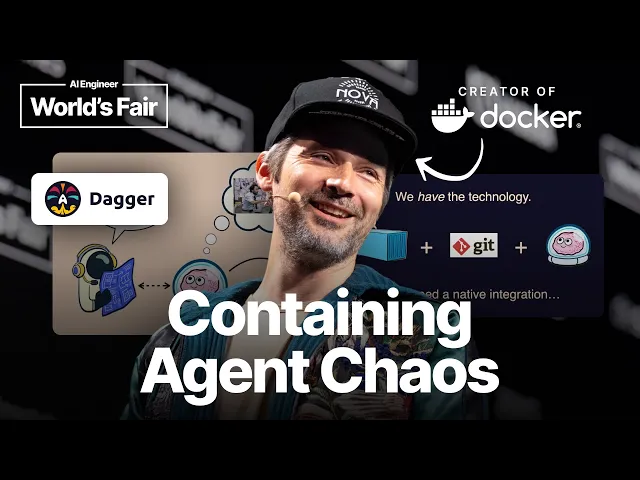Containing Agent Chaos

Dagger tackles developer workflow chaos
Solomon Hykes, co-founder of Docker, is back with a fresh perspective on solving one of the most persistent challenges in modern software development: the chaotic state of developer workflows. In his recent talk about Dagger, Hykes articulates a vision for bringing order to the fragmented world of CI/CD, where developers constantly juggle multiple tools, environments, and configurations just to ship code effectively.
A familiar problem with a new solution
Hykes frames the developer workflow problem through an agent-centric perspective that feels both novel and intuitive. After revolutionizing containers with Docker, his focus has shifted to addressing what he sees as the next major friction point in software development. The core challenge isn't just technical—it's about bringing harmony to increasingly complex, distributed workflows that drain productivity and create frustrating inconsistencies.
-
The agent problem: Development workflows suffer from a proliferation of disconnected agents (CI runners, local dev environments, build systems) that don't share context or capabilities, creating friction between environments.
-
Configurability trap: Today's CI/CD systems offer nearly unlimited configurability but at the cost of mounting complexity and maintenance overhead, leading to specialized "pipeline engineers" just to manage the tooling.
-
Dagger's approach: Rather than creating yet another CI system, Dagger functions as a portable development engine that runs workflows consistently across environments, providing developers with reliable "it works on my machine and in production" experiences.
-
Unified programmable interface: Dagger implements a coherent, code-based approach where workflows are defined in general-purpose languages rather than specialized YAML or DSLs, making them easier to maintain and extend.
The paradigm shift: programmable over configurable
The most compelling insight from Hykes' presentation is his distinction between configuration and programming as approaches to workflow management. While CI systems have grown increasingly configurable, they've often done so through increasingly complex configuration formats and DSLs. These configurations become unwieldy "configuration programs" without the benefits of actual programming languages—debuggers, proper testing, and modularity.
This matters profoundly because it represents a fundamental rethinking of how developers should interact with their tools. Rather than learning specialized configuration formats for each tool in their chain, Dagger allows developers to define workflows in
Recent Videos
How To Earn MONEY With Images (No Bullsh*t)
Smart earnings from your image collection In today's digital economy, passive income streams have become increasingly accessible to creators with various skill sets. A recent YouTube video cuts through the hype to explore legitimate ways photographers, designers, and even casual smartphone users can monetize their image collections. The strategies outlined don't rely on unrealistic promises or complicated schemes—instead, they focus on established marketplaces with proven revenue potential for image creators. Key Points Stock photography platforms like Shutterstock, Adobe Stock, and Getty Images remain viable income sources when you understand their specific requirements and optimize your submissions accordingly. Specialized marketplaces focusing...
Oct 3, 2025New SHAPE SHIFTING AI Robot Is Freaking People Out
Liquid robots will change everything In the quiet labs of Carnegie Mellon University, scientists have created something that feels plucked from science fiction—a magnetic slime robot that can transform between liquid and solid states, slipping through tight spaces before reassembling on the other side. This technology, showcased in a recent YouTube video, represents a significant leap beyond traditional robotics into a realm where machines mimic not just animal movements, but their fundamental physical properties. While the internet might be buzzing with dystopian concerns about "shape-shifting terminators," the reality offers far more promising applications that could revolutionize medicine, rescue operations, and...
Oct 3, 2025How To Do Homeless AI Tiktok Trend (Tiktok Homeless AI Tutorial)
AI homeless trend raises ethical concerns In an era where social media trends evolve faster than we can comprehend them, TikTok's "homeless AI" trend has sparked both creative engagement and serious ethical questions. The trend, which involves using AI to transform ordinary photos into images depicting homelessness, has rapidly gained traction across the platform, with creators eagerly jumping on board to showcase their digital transformations. While the technical process is relatively straightforward, the implications of digitally "becoming homeless" for entertainment deserve careful consideration. The video tutorial provides a step-by-step guide on creating these AI-generated images, explaining how users can transform...
